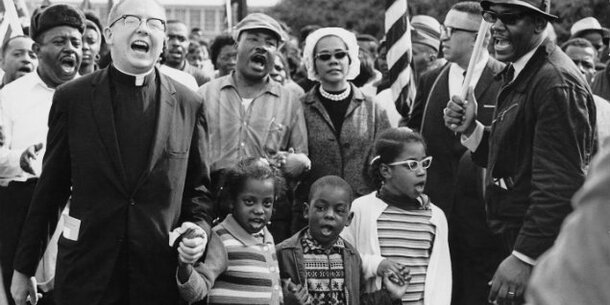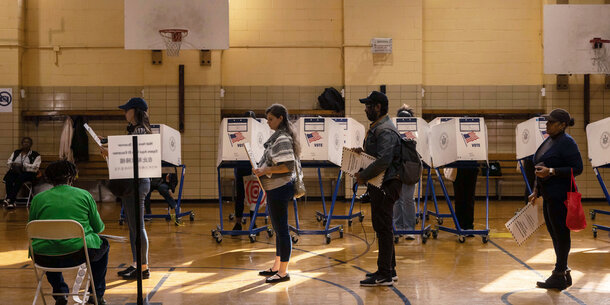Throughout American history, politicians have leveraged lies about the criminality of Black Americans to undermine their claims to full citizenship and paint Black voter participation as a threat to the nation. These themes played out in 2020 as predominantly Black cities became the center of voter fraud accusations.
Below, Brennan Center researchers discuss two new articles on the links between individuals’ perceptions of Black Americans and their belief in voter fraud. The studies show that racist attitudes are linked to distrust in the 2020 election results, cynicism toward Black American voters, and, ultimately, support for the January 6 insurrection.
Voters with Racial Bias Attribute Voter Fraud to Predominately Black Cities — Kevin Morris
In our working paper, forthcoming in Political Behavior, Ian Shapiro and I conducted three different studies to examine the role that racial prejudice plays in the voter fraud beliefs of some white Americans. First, we examined the nearly 3 million Twitter posts from 2020 that included the phrase “voter fraud.” We wanted to know: When Twitter users talked about voter fraud, what sorts of cities did they focus on? Unsurprisingly, cities like Detroit and Philadelphia were talked about the most frequently. But when we systematically looked at all these posts, a broader trend emerged: The larger the Black share of the population, the more a city was mentioned alongside the phrase “voter fraud” in the aftermath of the 2020 election. This was true even after we accounted for the fact that cities with large Black populations are more likely to vote for Democratic candidates. Simply put, Black cities were overrepresented in narratives about voter fraud in the postelection period.
Of course, knowing that predominantly Black cities were overrepresented in these conversations doesn’t reveal much about who actually believed the lies. To test which white Americans were the most likely to believe the lies about the 2020 election, we turned to the Cooperative Election Study, a large academic survey. It asked Americans before the election how confident they were that the election would be run fairly. They were then asked after the election how fairly it was run. These interviews with the same individuals over time allowed us to observe whose confidence deteriorated the most once the election lies spread.
Unsurprisingly, confidence in the election generally decreased for Trump supporters following Election Day, likely in part due to the “sore loser” phenomenon. But support for Trump isn’t the only predictor of whether a white American’s confidence deteriorated after Trump lost.
Political scientists use a measure known as racial resentment to measure racial animus among white Americans. The racial resentment scale was designed to pick up on implicit racial biases rather than overt, “old-fashioned” racism. It asks about things like whether respondents believe that structural racism continues to shape the lives of Black Americans. While the scale isn’t perfect, it is the primary way that social scientists measure white racial biases. Even after we accounted for factors such as individuals’ ideological orientation, support for Trump, and education, the pattern is clear: Confidence in the 2020 election decreased far more among white Americans who scored high on the racial resentment scale than among others. In fact, for Trump supporters who scored low on the scale, confidence hardly decreased at all.
To be sure, it seems possible that the people more likely to be racially biased might simply have been exposed to more lies about the election for a reason unrelated to their biases. In that case, it wouldn’t be their views on race that led them to doubt the election but rather the environment in which they found themselves. To rule out this possibility, we ran an experiment on about 1,500 white Americans. Our respondents saw either a fake news story about accusations of fraud against a predominantly white fictional city; accusations against a predominantly Black fictional city; or a story with no accusations of fraud at all. We then asked respondents how credible they found the accusations.
The results were alarming: White Republicans found accusations against the Black city considerably more believable than accusations against the white city. But once again, existing racial bias played an outsize role, as white Americans with higher existing racial bias were much more likely to believe fraud accusations than others. This was especially true for biased white respondents who saw the story about the fictional majority-Black city.
Racial Bias Influences Beliefs in Voter Fraud and Support for the Insurrection — Chelsea Jones
The January 6 insurrection demonstrated that voter fraud lies are not simply problematic narratives but also catalysts for political violence. President Trump’s false claim that the 2020 election was stolen is cited as one of the key reasons for the violent invasion of the U.S. Capitol. While many initially condemned the actions of the insurrectionists, a large portion of Americans have come to sympathize with this group’s grievances and feel that their actions were justified.
In our recently published article in the Journal of Race, Ethnicity, and Politics, Tye Rush, Micheal Herndon, Matt Barreto, and I ask: Beyond support for President Trump, what explains some white Americans’ belief in voter fraud and subsequent support for the insurrection? The clearest explanation is racial bias.
“Stop the Steal,” the rallying cry of insurrectionists, was undergirded by the belief that the 2020 election results and attempts to certify it were not trustworthy. We utilized a large-scale academic survey to show that this loss of trust among some white voters developed alongside Trump’s changing rhetoric about the 2020 election. Before the election, the American National Election Study asked individuals how accurately they thought votes would be counted. Immediately following the election, voters were asked to reflect on how often votes are counted fairly.
Similar to Morris and Shapiro’s article, our results show that trust declined among many white Americans after the 2020 election when President Trump began to blame his loss on voter fraud among Black Americans, majority-Black cities, and immigrant communities.
The president’s focus on diverse cities and voters of color gives reason to believe that racializing the concept of voter fraud activates an underlying fault line in American politics: distrust in and bias toward people of a different race. Political scientists have found that for some Americans, bias manifests as a sense of racial superiority where one views one’s own racial group as the center of society and views other racial groups with contempt. This disposition has been found to predict an individual’s candidate choice, policy preferences, and views toward immigrants.
Using the American National Election Study, we measured this type of racial bias among white Americans to understand the role it plays in beliefs about voter fraud. Respondents were asked to rate their feelings toward each racial group, including their own. We then calculated the difference between the rating for the racial group they belong to and their combined rating for racial minorities. Those who hold other white people in much higher regard than people of color are considered to have high levels of racial bias, which we call white racial antipathy.
Among white Americans in our sample, as an individual’s level of white racial antipathy increased, their trust in the 2020 vote count decreased. More specifically, those who viewed other racial groups more negatively than their own were more likely to trust the vote count before the election and less likely to trust it afterward. These results hold even when we account for partisanship, support for Trump, and other explanations.
We tested this relationship again using a different large-scale nonpartisan postelection survey, the CMPS, which directly asks whether individuals believe there was voter fraud in the 2020 presidential election. Respondents were split into two groups, and each group was asked different versions of the question. Responses to both questions clearly indicate that individuals with higher levels of white racial antipathy were more likely to believe there was voter fraud.
Lies about voter fraud erode trust in those who carry out our elections. Given this, we study whether the same social mechanisms that power belief in voter fraud also drive support for the actions of the January 6 insurrectionists. We again utilized the CMPS, which asks whether individuals believe January 6 was “a coordinated act of insurrection against the United States” or “mostly a protest that went too far.”
What we found was extremely troubling. White Americans with high levels of racial antipathy are more likely to consider the insurrection a protest that went too far. Some white Americans, particularly those who hold negative views toward people of color, believe that the January 6 attack on the Capitol was an appropriate means to protect the country, despite the numerous lives lost.
American elections are highly secure. In fact, President Trump’s own Department of Justice called the 2020 election the most secure election in the nation’s history. Yet candidates continue to point to false claims of voter fraud to contest their election losses. As these studies show, these lies are grounded in, and reinforce racist attitudes and tie into white America’s long-standing fears of real multiracial democracy. The events of January 6, 2021, were a vivid example of how racial bias and belief in politically motivated lies can embolden some Americans to commit political violence. As Trump and other influential voices seek to push untrue narratives about Americans of color, we should be vigilant to how this work might seed the next Big Lie and further erode democratic values.







